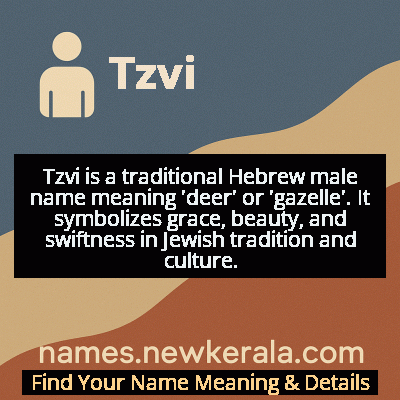Tzvi Name Meaning & Details
Origin, Popularity, Numerology Analysis & Name Meaning of Tzvi
Discover the origin, meaning, and cultural significance of the name TZVI. Delve into its historical roots and explore the lasting impact it has had on communities and traditions.
Name
Tzvi
Gender
Male
Origin
Hebrew
Lucky Number
5
Meaning of the Name - Tzvi
Tzvi is a traditional Hebrew male name meaning 'deer' or 'gazelle'. It symbolizes grace, beauty, and swiftness in Jewish tradition and culture.
Tzvi - Complete Numerology Analysis
Your Numerology Number
Based on Pythagorean Numerology System
Ruling Planet
Mercury
Positive Nature
Adventurous, dynamic, curious, and social.
Negative Traits
Restless, impatient, inconsistent, prone to indulgence.
Lucky Colours
Green, white.
Lucky Days
Wednesday.
Lucky Stones
Emerald.
Harmony Numbers
1, 3, 9.
Best Suited Professions
Sales, marketing, travel, entertainment.
What People Like About You
Versatility, charisma, adventurous spirit.
Famous People Named Tzvi
Tzvi Hirshfeld
Rabbi and Educator
Prominent Modern Orthodox rabbi and rosh yeshiva at Yeshivat Ma'ale Gilboa
Tzvi Fishman
Author and Filmmaker
Award-winning filmmaker and author of numerous books on Jewish spirituality
Tzvi Hersh Weinreb
Rabbi and Psychologist
Executive Vice President Emeritus of the Orthodox Union and clinical psychologist
Tzvi Avni
Composer
Influential Israeli composer known for blending Western and Middle Eastern musical traditions
Name Variations & International Equivalents
Click on blue names to explore their detailed meanings. Gray names with will be available soon.
Cultural & Historical Significance
The name carries particular weight in Zionist history, as it represents the connection to the Land of Israel and its native wildlife, embodying the renewal of Jewish life in the ancestral homeland. In modern Israel, the name maintains its traditional roots while serving as a bridge to contemporary Jewish identity. The cultural significance extends beyond religious contexts into national symbolism, where the gazelle represents the beauty of the Israeli landscape and the resilience of the Jewish people returning to their homeland after centuries of exile.
Extended Personality Analysis
Individuals named Tzvi are often perceived as graceful, intuitive, and spiritually attuned. They tend to possess a natural elegance in their movements and mannerisms, combined with sharp mental agility that allows them to navigate complex situations with ease. These individuals typically demonstrate sensitivity to their environment and the people around them, showing empathy and understanding in interpersonal relationships. Their deer-like qualities manifest as both physical grace and mental quickness, often making them excellent problem-solvers who can see solutions others might miss.
While they may appear gentle and reserved, Tzvim often possess inner strength and resilience, able to move through challenges with determination and purpose. They value harmony and beauty in their surroundings and often have artistic or creative inclinations. Their intuitive nature makes them excellent judges of character, and they tend to form deep, meaningful relationships. The combination of physical grace and mental sharpness often results in individuals who are both practical and visionary, capable of implementing their ideals in tangible ways. They typically approach life with a blend of caution and courage, much like the deer that moves carefully through the forest yet can leap boldly when necessary.
Modern Usage & Popularity
In contemporary times, Tzvi remains a popular name in Jewish communities worldwide, particularly in Israel and Orthodox Jewish circles. While it maintains traditional roots, the name has seen steady usage without becoming overly common. In Israel, it's considered a classic Hebrew name that bridges traditional and modern sensibilities. Among diaspora Jewish communities, Tzvi is often chosen by parents seeking a name with strong Jewish identity and beautiful symbolism. The name has maintained consistent moderate popularity rather than experiencing dramatic trends, reflecting its status as a timeless choice. Recent years have seen some increase in usage as parents return to traditional Hebrew names with meaningful symbolism, and it frequently appears in combination with other Hebrew names in both religious and secular Jewish families.
Symbolic & Spiritual Meanings
The name Tzvi carries rich symbolic meanings beyond its literal translation as 'deer'. In Jewish mysticism, the deer represents the soul's yearning for God and spiritual elevation. The animal's agility and alertness symbolize spiritual awareness and the ability to navigate life's challenges with grace. The deer's beauty is seen as reflecting divine beauty, while its swiftness represents the quickness with which good deeds should be performed. In Kabbalistic thought, the deer symbolizes the sefirah of Tiferet (beauty and harmony), representing balance between different divine attributes. The deer's seasonal antler growth and shedding is interpreted as symbolic of spiritual renewal and personal growth cycles, making the name Tzvi emblematic of continuous self-improvement and the pursuit of higher consciousness.

